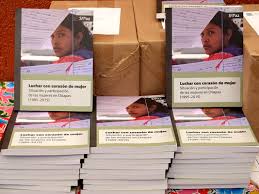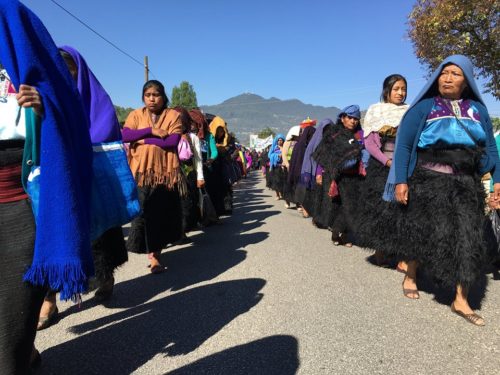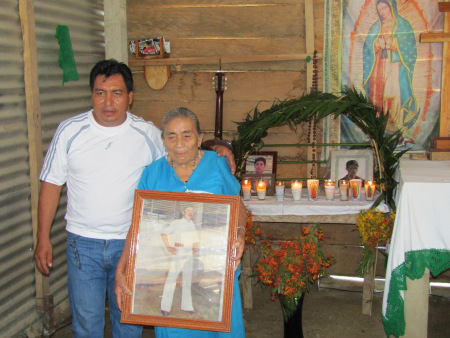.
Ethnic groups in Chiapas have almost no water, but are drowning in Coca-Cola

By Marco Appel, 5th February, 2016.
Coca-Cola, the Secret Formula, a French documentary aired on Belgian television three years ago, really put a bee in the bonnet of the fizzy drink giant. They even issued a complaint to the ethical advisory board of the Belgian press. The documentary relays the investigation of a French reporter to find out the precise recipe of the fizzy drink. Among her discoveries was that one of the main ingredients is…water. Lots of it. One litre of the sugary drink requires three litres of liquid. And one of the places where the multinational obtains this raw material, for next-to-nothing and to the detriment of local provision, is Chiapas.
Brussels (Proceso).
Coca-Cola: The Secret Formula is the title of a documentary that tells of the ups and downs of French journalist Olivia Mokiejewski in her mission to find out the ingredients used in the making of this fizzy drink, kept secret by the company with a military seal.
One of these ingredients is water. For this reason, part of the documentary is filmed in the area of San Cristobal de las Casas, Chiapas, where it is nothing if not plentiful.
The journalist, who made the journey to this part of Mexico, reveals that to produce one litre of Coca-Cola, you need three litres of water.
“There’s no shortage of water”, Mokiejewski’s voiceover tells us. “The region is one of Mexico’s reservoirs: a paradise for the makers of fizzy drinks. It’s no coincidence that Coca-Cola decided to build a factory here in the 1980s.
The journalist interviews hydrologist Antonino García, who explains that the fizzy drink giant moved in “strategically” to extract the water directly from San Cristobal’s underground channels. He tells us that every day they take 750,000 litres – enough to give daily drinking water to a population of 10,000 people.
“I suppose Coca-Cola must pay a high price to compensate the region for all the water it uses”, the young journalist remarks.
Laughing, Garcia tells her that no, Coca-Cola paid just €25,000 in 2003, all thanks to then-President Vicente Fox, who was also president of the company’s Mexico branch.
“€25,000 for hundreds of millions of litres of water”, Mokiejewski repeats. “The main ingredient of Coca-Cola costs the company practically nothing”,
The documentary explains that there are five communities that that depend on the same underground channels used by the fizzy drink company. There, the water is scarcer every day.
A family from one of these communities shows the journalist that they don’t currently have any running water, and the shortage is happening ever more frequently. They turn on the tap and nothing comes out. They must use rainwater or water from the well, which isn’t clean and makes the children ill.
Mokiejewski talks into the camera: “Deprived of water in a region in which it abounds, the residents contacted Coca-Cola. But the multinational insists that there is no link between their intensive extraction and the water shortage. And the most ironic thing about it? When there’s no water, the children are given fizzy drinks. It’s a vicious circle, one in which the indigenous people of Chiapas are trapped”, Mokiejewski reflects. Accompanying her final words is the image of a little boy, almost a baby, drinking coke from a feeding bottle.
This extract of the report specifically is included in a complaint the company Coca-Cola Belgian Services presented on the 22nd of May last year to the Belgian Ethical Advisory Board for Journalism (Conseil Déontologique Periodique de la Belge – CDPB) against the company Belgian Francophone Radio Television (Radio Televisión Belga Francófona – RTBF), which aired the French documentary in the country.
The board, created in 2009 and formed of 20 journalists and editors, receives complaints and proffers its opinion on cases related to the treatment of information in the Belgian media. Its general secretary, André Linard, told Proceso that the board had never before received a complaint of this kind.
In it, the fizzy drink giant told the CDPB that the investigation relating to Mexico contains “inexact information”, and that furthermore, the whole report demonstrates “a desire to destroy the reputation of Coca-Cola”.
Last December 1st, the ethical standards board published its conclusions: the documentary, it stated, followed a “correct” method of journalistic investigation and the journalist who carried out the work, Olivia Mokiejewski, respected professional ethical guidelines.
The board found in the documentary no violations of the Belgian ethical code; no “flaws in the investigation or respect for the truth” (article 1), no “absence of source-checking” (article 4), and no “deforming of information or deletion of essential information” (article 3).
“Factually accurate” Documentary
The documentary Coca-Cola: the Secret Formula was made in 2012 by the French producer Nilaya, and was coproduced by France Télévisions, the audiovisual organization of the French State. It was filmed in France, the USA and Mexico, and was originally aired on the French public television channel France 2 as part of the journalistic investigation programme Infrarouge. It is 65 minutes long; the part about Mexico lasts 12 minutes.
In Belgium, the documentary was shown on four occasions on the RTBF channel Uno in January 2013. Coca-Cola has stated that it was in communications with the RTBF to demand that it correct the supposedly erroneous information before the fourth reshowing of the documentary, on May 13th 2015. The television company refused the demand.
A significant part of the report takes place in the USA (Atlanta, New York and California), where through interviews with first hand sources the journalist manages to get hold of the secret Coca-Cola formula. These ingredients include coca leaf extract (imported from Peru and Bolivia and used to give the fizzy drink its bitter aroma); an amount of sugar equal to ten dessert spoons per can, and a caramel chemical, one such E.150D, which in 2007 was revealed to be carcinogenic (causing leukaemia in animals).
The public health authorities in California limited the use of E.150D to 29 micrograms per can of Coca-Cola, the French reporter is told by Mike Jacobson, director of the California Centre for Science in the Public Interest. In the documents that the expert shows the camera, we can see that in Mexico, they allow 147 micrograms of the chemical per can.
The fizzy drink company says it lost €1.6 million in sales in Belgium as a result of the first four showings of the documentary.
According to the CDPB’s conclusive statement, which the writer was able to access, the television provider argued in its defence that it had not produced the report and could not, therefore, answer every question about it in detail.
It also claimed that “the aim of the documentary was nothing other than to inform” and considered that “the (informative) result is sufficiently credible for France Télévision to air it without modifications, in spite of its criticisms”.
The Belgian television provider underlines the fact that during her investigation, Mokiejewski was given no straight answers by the firm when she sought them: “Refusing to give interviews is always risky and then it’s all too easy to complain afterwards”, the RTBF points out to Coca-Cola, who, in their statement of complaint also insisted that it was untrue that the fizzy drink company had refused to respond to her questioning and that in any case, “she had not asked the right people.”
In the documentary, the journalist mentions that for two months she requested interviews with directors of the company, to which end she sent 21 emails and made 12 phone calls. In one of them, we hear someone from the company’s PR department clearly deny her a statement of any kind.
In another scene, we see Mokiejewski go to a house in the USA to look for the president and executive director of the firm, Muhtar Kent. On the intercom at the gate of the house, she explains that she has spent two months trying to get an interview with Kent, but the person on the other end rudely hangs up on her, leaving her no choice other than to leave a note on top of the intercom, stating her request for interview.
Fizzy drink paradise
Another scene filmed in Mexico, and which Coca-Cola also include in their complaint in Belgium, is about the price of the fizzy drink, which is mentioned in the documentary.
This episode begins when Mokiejewski tells us that “Mexicans have become the top consumers of Coca-Cola in the world. And in Chiapas, they have broken records: three cans per person, per day.”
While they travel along a local road in a van, Marcos Arana, doctor and public health expert, tells the journalist that mothers in the region give Coca-Cola to their children before they reach two years of age, which damages their nutrition habits and makes them addicted to sugar. Arana invites the journalist to count the shops selling Coca-Cola: they find 166 in the 42 kilometres they travel.
We see images of indigenous young people grouped around one of these shops. “A country painted in red and white,” Mokiejewski reflects, “the perfect economic model for Coca-Cola. Even in the most remote town in Chiapas, the multinational has set in motion an unbeatable strategy.”
The journalist is talking about the rental of refrigerators exclusively for the use of products made by the fizzy drink company, which she hears about from a shop-owner she interviews.
Outside one shop there is a kind of sign, which the companies give them, with photos of the different drinks and their respective prices. It says a litre of Coca-Cola costs seven pesos, one of water costs eight. The three litre bottle of Coca-Cola is sold at 21 pesos. Arana notes that three litres of water must therefore cost 24 pesos. “Water is more expensive than Coca-Cola; that’s the problem”, the journalist concludes.
Then a voiceover tells us, “Today the indigenous people of Chiapas cannot live without Coke. It has gone so far as to insert itself into religion, replacing pox, the traditional drink, in sacred ceremonies.”
The journalist attends a family prayer where they are asking for the good health of a little boy with a fever. She describes the scene as follows: “To satisfy the gods, there are no less than seven bottles of Coke in the offering.”
The patriarch of the family, an elderly man, confirms proudly that the drink is now part of the region’s “culture”, and explains that the burps it causes shoo away bad spirits. His words are accompanied, in the documentary, by images of members of the family drinking Coca-Cola from small glasses with a ritualistic attitude, even closing their eyes.
Mokiejewski’s last comment in the Chiapan episode of her documentary is frightening: “In Mexico, 70% of the population are overweight or obese. According to the Mexican body for Monitoring Health, in 2020, this will apply to 100% of the population.”
Unfinished business
Proceso contacted Mokiejewski, who said she knew nothing about Coca-Cola’s complaint in Belgium.
For his part, André Linard, general secretary of the Belgian Ethical Advisory Board for Journalism, explains: “We do not repeat the journalist’s investigation; what we examine is how she worked: whether all the ethical rules of the journalistic exercise were respected. In this case, we won’t be going to Chiapas to check.
However, during the 80s and 90s, Linard did travel to Chiapas some seven or eight times as a journalist. Specifically, he was in San Cristobal, so he can say he “knew the context of [Coca-Cola’s] complaint”.
Linard does not understand the reasons behind Coca-Cola’s attempt to discredit the journalistic work of the French report in Belgium, but he does highlight that, “In the six years that the board has existed, we’ve dealt with more than 300 cases and I cannot remember a single one by an internationally recognised business in relation to the production of journalistic content aired in Belgium.”
Among journalists, the CDPB’s verdict has moral weight; it deals neither in sanctions nor fines.
“If the opinion of the board had been unfavourable to the RTBF, what would have happened?”, Linard is asked.
“A negative ruling means that we find an ethical misdemeanour and at that point the media in question is obliged to inform its audience of our decision through a notice on their website. There is no censorship; we’re not going to ban future showings of the report, but the RTBF would have to take our decision into account when considering further airings of the documentary. The media organization is responsible for taking that decision. We do not hold the right to ban the publication of anything. Freedom of expression is a fundamental right.
The conclusions of the board concerning the information conveyed in the Mexican episode of the documentary states, “the subject discussed sparks debates, both about the amount of water necessary and the effects of the manufacture in Chiapas on the local population.”
And finally: “The overall tone is critical, but the media has the right to be so, since they constitute a system of checks and balances. Just because a report is critical doesn’t necessarily mean it is taking sides or remaining neutral.”
Translated by Ruby Zajac for the UK Zapatista Translation Service
Posted by Dorset Chiapas Solidarity
http://www.proceso.com.mx/429101/las-etnias-de-chiapas-casi-sin-agua-pero-ahogadas-en-coca-cola
.
.
 Photo@Denuncia Publica
Photo@Denuncia Publica






 Banner in a Chiapas march: “We are fed up with: 1. the hikes in fuel prices; 2. the cost of electricity; and 3. the price of gas. But we’re more fed up with the coward who does nothing. Wake up mother fucker!
Banner in a Chiapas march: “We are fed up with: 1. the hikes in fuel prices; 2. the cost of electricity; and 3. the price of gas. But we’re more fed up with the coward who does nothing. Wake up mother fucker! Aerial view of the town of Oxchuc, the capital of Oxchuc municipality, located in the Highlands of Chiapas, Mexico.
Aerial view of the town of Oxchuc, the capital of Oxchuc municipality, located in the Highlands of Chiapas, Mexico. Mayor Oscar Gómez López and his Emiliano Zapata banner.
Mayor Oscar Gómez López and his Emiliano Zapata banner. Chiapas civil society protest against the hike in gas prices.
Chiapas civil society protest against the hike in gas prices.

 Victims’ relatives continue to seek justice 20 years later. Photo@SIPAZ
Victims’ relatives continue to seek justice 20 years later. Photo@SIPAZ Demonstration Against Child Deaths in San Cristobal de las Casas, Chiapas, Mexico | Photo: Melel Xojobal
Demonstration Against Child Deaths in San Cristobal de las Casas, Chiapas, Mexico | Photo: Melel Xojobal
 EZLN Sympathizers arrived in Palenque’s principal plaza. Photo: Isaín Mandujano
EZLN Sympathizers arrived in Palenque’s principal plaza. Photo: Isaín Mandujano Teachers affiliated with the CNTE union march during a demonstration against Mexico’s President Enrique Pena Nieto’s education reform, Aug. 16, 2016. | Photo: teleSUR
Teachers affiliated with the CNTE union march during a demonstration against Mexico’s President Enrique Pena Nieto’s education reform, Aug. 16, 2016. | Photo: teleSUR






